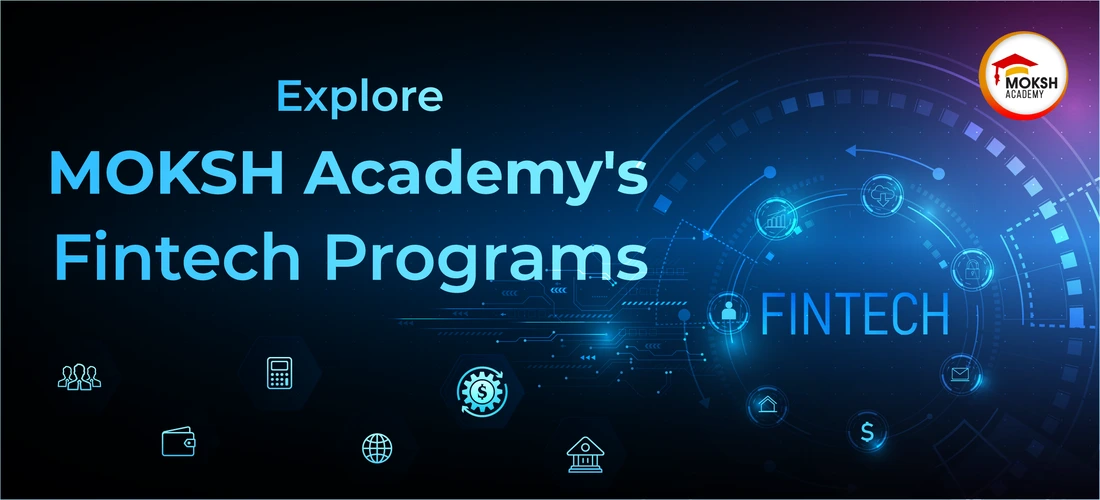
Welcome to MOKSH Fintech's innovative programs, tailored to prepare you for success in the dynamic field of financial technology. Our cutting-edge courses are designed to provide you with the skills and knowledge necessary to excel in the rapidly evolving world of FinTech. Whether you're looking to launch a career in this exciting industry or seeking to enhance your existing skills, our programs will equip you with the tools and expertise needed to thrive. Join us and embark on a journey towards a rewarding and impactful career in financial technology.
Blockchain & Cryptocurrency
Our Blockchain courses are designed to prepare you for careers in cryptocurrency, digital ledger technology, and blockchain security. They give you the skills to excel in this innovative field. You'll learn about the basics of blockchain and its applications, as well as how to secure digital transactions. These courses are suitable for beginners and those with some background in technology. By the end, you'll be ready to apply your knowledge to real-world situations and contribute to the growing field of blockchain technology.
- Certification - 6 Months
- Masters - 2 Years
Course Outline
- Introduction to Blockchain
- Distributed Ledger Technology
- Hashing, Encryption, and Decryption
- Trust Frameworks and Consensus Mechanisms
- Public Consortium and Private Blockchains
- Cryptocurrencies and Initial Coin Offerings (ICOs)
- Smart Contracts and Decentralized Applications (DApps)
- Tokenization and Non-Fungible Tokens (NFTs)
- Digital Currencies and Central Bank Digital Currencies (CBDCs)
- Decentralized Finance (DeFi)
- Augmented Reality (AR), Virtual Reality (VR), and Metaverse
- Allied Use Cases and Applications
Data Science & Analytics
Our Data Science & Analytics courses teach you how to understand and work with complex data. They cover topics like statistics, machine learning, data visualization, and data mining. These courses help you learn how to use different tools and methods to find useful information in data and make smart choices based on it. Whether you're just starting or want to progress in your career, these courses can give you the skills you need to do well in this fast-growing field.
- Certification - 6 Months
- Masters - 2 Years
Course Outline
- Introduction to Data Science and Analytics
- Data Collection and Cleaning
- Exploratory Data Analysis (EDA)
- Statistical Analysis and Hypothesis Testing
- Data Visualization
- Machine Learning (Supervised, Unsupervised, and Reinforcement Learning)
- Big Data Technologies (Hadoop, Spark)
- Natural Language Processing (NLP)
- Deep Learning
- Ethics and Privacy in Data Science
Financial Programming & Quantitative Finance
Financial Programming & Quantitative Finance courses focus on the mathematical and statistical techniques used in finance. These courses cover topics such as financial modelling, risk management, derivative pricing, and algorithmic trading. By completing these courses, you will learn how to use programming languages like Python and R to analyze financial data and develop trading strategies. Whether you are interested in a career in investment banking, hedge funds, or financial analysis, these courses can provide you with the skills and knowledge needed to succeed in the finance industry
- Certification - 6 Months
- PG Diploma - 1 Years
Course Outline
- Introduction to Financial Programming and Quantitative Finance
- Programming Languages for Finance (e.g., Python, R, MATLAB)
- Data Retrieval and Manipulation for Financial Analysis
- Financial Modeling and Simulation
- Time Series Analysis and Forecasting
- Risk Management Models (e.g., VaR, CVaR)
- Portfolio Optimization and Asset Allocation
- Derivatives Pricing and Hedging Strategies
- Machine Learning in Quantitative Finance
- Case Studies and Practical Applications in Quantitative Financ
Cyber security in Finance
Cybersecurity in Finance courses focus on protecting financial systems and data from cyber threats. These courses cover topics such as network security, encryption, risk management, and compliance. By completing these courses, you will learn how to identify and mitigate cybersecurity risks in financial organizations. You will also learn about the latest cyber threats and how to defend against them. Whether you are interested in cybersecurity as a career or want to enhance your skills in finance, these courses can provide you with the knowledge and expertise needed to protect financial systems and data.
- Certification - 3 Months
- PG Diploma - 1 Years
Course Outline
- Introduction to Cyber Security in Finance
- Overview of Cyber Threats in the Financial Sector
- Regulatory Landscape and Compliance Requirements
- Risk Management Frameworks for Cyber Security
- Security Architecture and Design Principles
- Identity and Access Management (IAM) in Finance
- Data Protection and Privacy in Finance
- Incident Response and Business Continuity Planning
- Cyber Security Tools and Technologies
- Case Studies of Cyber Security Incidents in Financ
Mathematics & Actuaries
Mathematics & Actuarial courses focus on the mathematical principles used in insurance, finance, and risk management. These courses cover topics such as probability, statistics, calculus, and financial mathematics. By completing these courses, you will learn how to analyze and manage risk in various financial and insurance contexts. You will also develop strong mathematical and analytical skills that are highly valued in the insurance and finance industries. Whether you are interested in becoming an actuary or pursuing a career in finance, these courses can provide you with the foundation you need to succeed.
- Certification - 6 Months
- PG Diploma - 1 Years
- Masters - 2 Years
Course Outline
- Introduction to Actuarial Science
- Probability Theory
- Mathematical Statistics
- Life Contingencies
- Financial Mathematics
- Risk Theory
- Actuarial Models and Methods
- Professionalism and Ethics
- Case Studies and Applications
- Preparation for Actuarial Exam
Insurance Technology
Insurance Technology (InsurTech) courses teach how to use technology to improve the insurance industry. You'll learn about digital transformation, data analytics, artificial intelligence, and blockchain in insurance. These courses show how technology is changing insurance, like using big data to personalize products and AI for claims processing. Whether you're a tech pro specializing in insurance or an insurance pro learning about tech, these courses will help you understand the evolving InsurTech field.
Course Outline
- Introduction to Insurance Technology (InsurTech)
- Evolution of the Insurance Industry and Digital Transformation
- InsurTech Trends and Innovations
- Usage-based Insurance (UBI) and Telematics
- Artificial Intelligence and Machine Learning in Insurance
- Internet of Things (IoT) and Connected Devices in Insurance
- Blockchain Technology in Insurance
- Digital Distribution Channels and Customer Engagement
- Claims Processing Automation
- Regulatory Environment and Compliance in InsurTech
- Case Studies of InsurTech Implementation
Financial Technology Management
Financial Technology Management courses focus on the intersection of finance and technology, preparing students for leadership in the evolving FinTech industry. Topics include financial innovation, digital banking, blockchain, and regulatory challenges. Students learn to use technology for innovative financial products, understand FinTech's impact on traditional finance, and navigate regulations. Whether interested in entrepreneurship, consulting, or financial institution leadership, these courses provide the knowledge and skills for success in FinTech.
Course Outline
- Introduction to Financial Technology (FinTech)
- Overview of FinTech Industry and Trends
- Digital Transformation in Finance
- Blockchain Technology and Cryptocurrencies
- Artificial Intelligence and Machine Learning in Finance
- Big Data Analytics in Finance
- Regulatory Environment and Compliance in FinTech
- Risk Management in FinTech
- FinTech Entrepreneurship and Innovation
- Case Studies and Practical Applications in FinTech
FinTech Entrepreneurship
FinTech Entrepreneurship courses teach students how to start and grow successful financial technology (FinTech) businesses. Topics include market identification, innovative product development, fundraising, and regulatory navigation. Students learn to apply entrepreneurial principles to FinTech, understand sector-specific challenges, and develop skills for launching and managing FinTech startups. Whether aspiring entrepreneurs or professionals expanding into FinTech, these courses provide the knowledge and skills for success in the competitive FinTech entrepreneurship landscape
Course Outline
- Introduction to FinTech Entrepreneurship
- Understanding the FinTech Ecosystem
- Identifying FinTech Opportunities
- Market Research and Validation
- Business Model Development for FinTech Startups
- Funding and Financing Strategies
- Regulatory Considerations for FinTech Ventures
- Building and Managing FinTech Teams
- Marketing and Customer Acquisition in FinTech
- Scaling and Growth Strategies
- Case Studies of Successful FinTech Ventures
Digital Banking & Payments
Digital Banking & Payments courses explore the digital revolution in banking and payments. Topics include mobile banking, digital wallets, payment processing, cybersecurity, and regulations. Students learn about new technologies like mobile payments and blockchain, as well as the influence of fintech startups. These courses are ideal for banking professionals staying current with industry trends or entrepreneurs interested in digital finance innovations, offering insights into the evolving world of digital banking and payments.
- Certification - 6 Months
- PG Diploma - 1 Years
Course Outline
- Introduction to Digital Banking and Payments
- Evolution of Banking in the Digital Age
- Digital Banking System in India
- Real-Time Gross Settlement (RTGS) Systems
- Individual Payments & Digital Payment System
- Consumer and Retail Payment Innovation
- Payment Architecture and Technology
- Mobile Money, Mobile Wallet, UPI, IMPS
- CBDC Retail: E-Rupee
- Digital Financial Services & Regulations
- Future Trends in Digital Banking and Payments
Financial Modelling & Management
Financial Modelling & Management courses teach how to create and use financial models for informed business decisions. Topics include financial statement analysis, forecasting, valuation, risk management, and budgeting. Students learn to use tools like Excel for complex financial models, helping businesses optimize operations, manage risks, and make strategic decisions. Whether a finance professional enhancing analytical skills or a business owner improving financial planning, these courses provide knowledge and skills for success in financial modelling and management.
- Certification - 6 Months
- PG Diploma - 1 Years
Course Outline
- Introduction to Financial Modeling
- Financial Statement Analysis
- Forecasting Techniques
- Cost of Capital and Capital Budgeting
- Valuation Methods (DCF, Comparable Companies, Precedent Transactions)
- Sensitivity Analysis and Scenario Planning
- Risk Management and Monte Carlo Simulation
- Excel Skills for Financial Modeling
- Financial Modeling for Mergers and Acquisitions (M&A)
- Financial Modeling for Project Finance



